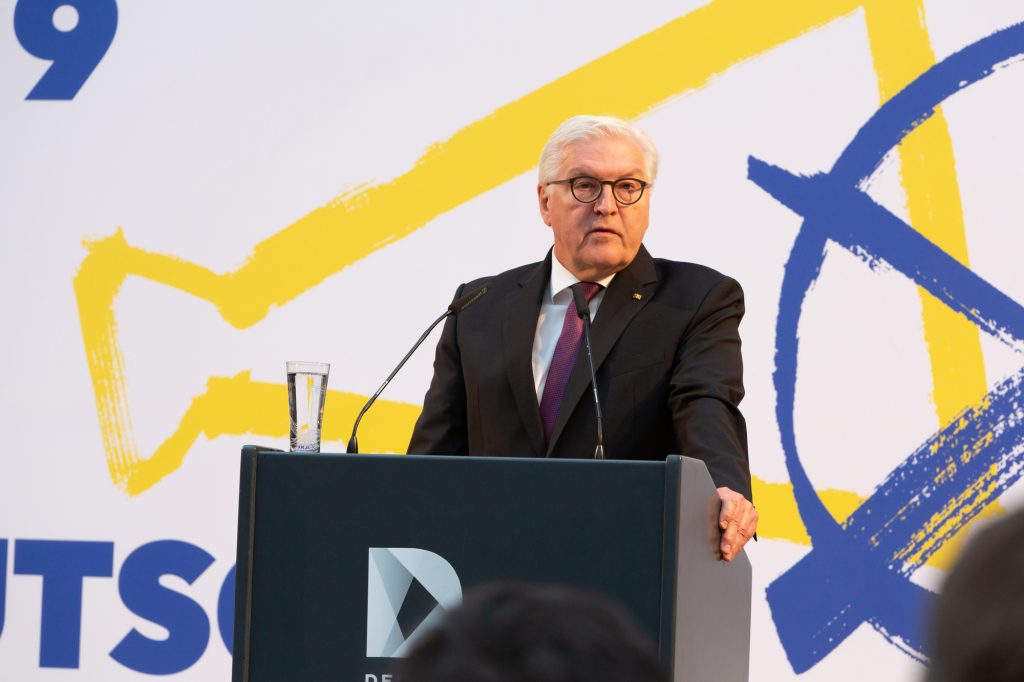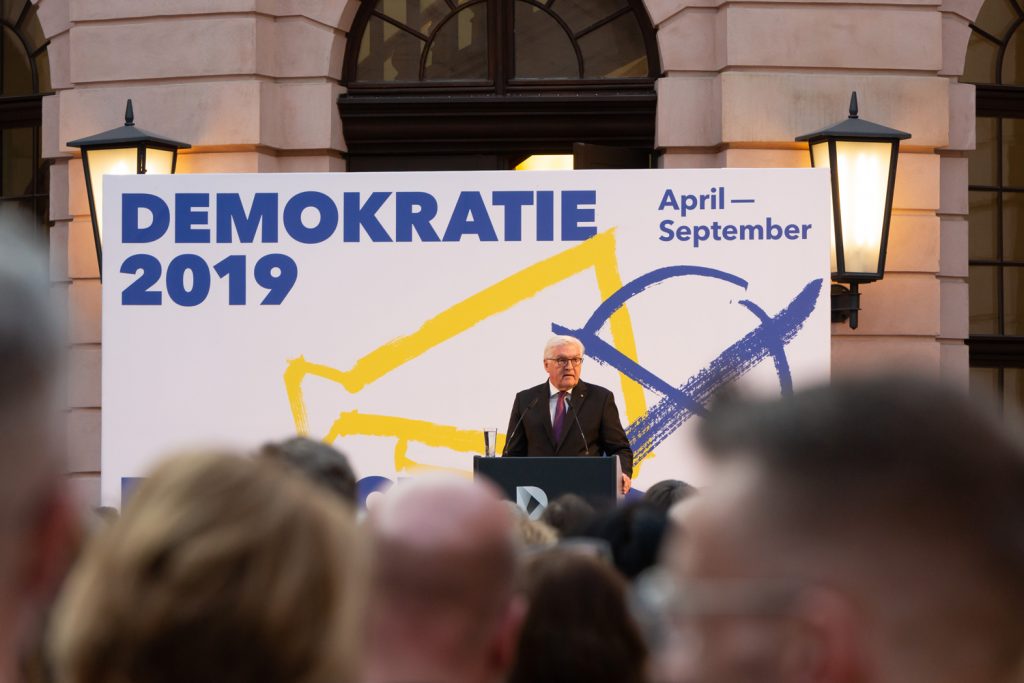
Democracy 2019
Opening speech by Federal President Frank-Walter Steinmeier
24 April 2019
The DHM blog here publishes a speech by Federal President Frank-Walter Steinmeier, given on 3 April 2019 at the opening of the exhibition ‘Weimar: The Essence and Value of Democracy’ at the Deutsches Historisches Museum in Berlin. The exhibition runs until 22 September 2019.
At the beginning of 1933, when anti-parliamentary forces had gained the upper hand in the Weimar Republic, the economist Moritz Julius Bonn cast a sober look back at the founding of the first German republic. After the collapse of the German Empire in 1918, he wrote, the country had had a ‘republic without republicans’, adding: it had been ‘necessary to improvise a democracy without democrats’.
Bonn himself was the best counter-argument to his own claim: he was a co-founder of the German Democratic Party, the liberal party which defended the constitution of the Weimar Republic. But at the moment he made his statement, he was influenced by the Republic’s existential crisis. He could have had no idea of the long afterlife enjoyed by his phrase ‘democracy without democrats’.
These days we are aware of just how strongly this phrase influenced the image of the Weimar Republic in this country after 1945, and how it contributed to many courageous and honourable democrats of that period being largely forgotten. For many years, the generally held view was that the failure of Weimar democracy was predetermined, that the Republic really never had a chance against its enemies on both the left and the right.
Today, one hundred years after the founding of the Weimar Republic, it is high time that we stop thinking and narrating its history from the point of its demise. Because there was more to the Republic than just the prehistory of National Socialism. This was not a one-way street into barbarism.
The outcome of the democratic experiment which began with the revolution of 1918–1919 was not predetermined.

Federal President Frank-Walter Steinmeier during his opening speech of the “Democracy 2019” focus of the Deutsches Historisches Museums © DHM/Thomas Bruns
I am delighted that commemoration in this anniversary year – here in Berlin, in Weimar, and in many other places in this country – has been shaped by this new perspective on the Weimar Republic. And I am particularly happy that all of you here in the Deutsches Historisches Museum are turning your attention to the women and men who built, designed and defended this first German democracy. It is a matter of great importance to me that we bring these people out from under the long shadow cast by the Republic’s failure. This was one reason why I was delighted to come and speak here this evening. And I am very grateful for the invitation.
‘On the Essence and Value of Democracy’ – even this exhibition’s name calls to mind a prominent legal philosopher of that time, one of the few who from the very start emphatically stood in defence of parliamentary democracy. Hans Kelsen, the antithesis of Carl Schmitt, published a book with this title in 1920, in which he laid out the core principles of a modern theory of democracy. In writing that the people were not a homogeneous unity, but a ‘bundle of groups’, that parties were ‘necessary and unavoidable’, that parliamentary procedure should aim for compromise and the peaceful settling of political antagonisms, he was taking aim, with great sobriety and reason, against authoritarian temptations, both then and now.
No, the Weimar Republic was not a democracy without democrats. This exhibition, as you will soon see, refutes that idea. It gives, as Walter Benjamin might have said, a physiognomy to democracy. It tells the story of the emergence of a modern society.
Hugo Preuss, the architect of the Weimar constitution, and Marie Juchacz, the first female representative to address a German parliament; Anita Augspurg, an early fighter for women’s rights, and Heinrich Brauns, a pioneering campaigner for unemployment insurance; Helene Stöcker, pacifist and social reformer, and Sylvia von Harden, journalist and poet of the Berlin bohème: they are all representatives of the progressive forces released then, at the beginning of this democracy, in politics but also in science, society and culture.
Much of what they fought for has shaped our country today, even if we often fail to realize it, and many of their ideas can still inspire us today. Parliamentary democracy and the social state, new philosophies in architecture and education, equal rights for gay people – this exhibition brings the Weimar Republic a lot closer to our contemporary world.
Above all, it shows the passion and creativity brought to their experiments by these early adopters of democracy, despite the heavy burdens which weighed on the Republic from its very first day. The first German democracy was encumbered by defeat in war and the impact of the Treaty of Versailles, by economic crisis and inflation, by a deeply divided society, by anti-liberal traditions and the murderous violence spread by reactionary forces throughout the country. All the more impressive, then, is the achievement of those who supported and strengthened that democracy!
Respect and gratitude is what we owe the democrats, reformers and visionaries of the Weimar era. But this is not the only reason why we should remember them. Particularly these days, when scepticism towards the essence and value of liberal democracy is again increasing, when those who despise freedom are again growing louder and more confident, even here in Europe, now more than ever do we need the memory of forgotten heroes of our democratic history, so as to invigorate and fortify our democracy.
Anyone who recalls the long and winding path to democracy in Germany, and the brave men and women who fought for freedom and self-determination, but who also remembers its wrong turns and precipices, will know this:
we Germans were not born to democracy, it is a historical achievement, and it is something that can be lost again.
For young Germans in particular, this is no longer self-evident. An entire generation now only knows Germany as a unified, democratic country in a peaceful Europe. That is our great fortune, but there is danger there too. Just as, one century ago, German democracy was not predestined to fail, today its success is not guaranteed. Again and again, we must work for it anew. Again and again, where necessary, we must fight for it.
A look back at history can reveal to us how important it is for people to take responsibility, to shoulder the burden of democratic politics, to be ready to compromise and to live with the consequences of compromise. And it can show us that an open society must remain a society that speaks to and with itself. That it depends on empathy, but also on solidarity.
Democratic engagement never only comes from cool rationality. Those who wish to commit to working for our democracy need traditions, role models, and inspirations. It is good that we are rediscovering the women and men of the Weimar Republic who spurred on progress. But the history of our democracy has many facets which deserve more attention than they have received: from the German Jacobins, to the revolutionaries of 1848, to civil rights activists in former East Germany. All of these epochs can show us what individuals can achieve; above all, they can reveal the effect we can have when we work together as democrats. Yes I do believe that we can draw strength and resolve from the history of our democracy. For both of those things, democracy has to be more than just history. It has to have a future!

Federal President Frank-Walter Steinmeier during his opening speech of the “Democracy 2019” focus of the Deutsches Historisches Museums © DHM/Thomas Bruns
I am delighted that all of you at the Deutsches Historisches Museum, with this exhibition, are bringing this history into the present day. I would like above all to invite young people to reflect on the democracy of the future in its salons and ‘labs’ in the coming months. On my visit to the exhibition I was accompanied by schoolchildren, and in my conversations with them I heard good things about the presentation and about the democracy lab that goes along with it.
It is important that history and commemoration do not congeal into rituals. The history of democracy, above all, should not be presented like a dry specimen in a glass case. Instead, it should always encourage people to get involved for themselves. Democracy never just is, it is always in the process of becoming. As democratic citizens, we are not an audience staring at history and at today’s status quo. It is in our hands to write our own history, to help shape its course.
This exhibition will help to keep memory alive. It will help young people understand just how much today’s freedoms have been shaped by those who bravely fought for Weimar democracy, one hundred years ago.
I hope that this exhibition teaches people a lot about the ‘essence and value of democracy’.
That we understand that democracy is not a given thing, and comes with no eternal guarantee.
That democracy lives from the engagement of its citizens. That it is citizens, with their various interests, sometimes conflicting ones, who constitute society.
That controversy is not foreign to democracy, but that a readiness to compromise is its prerequisite.
That the fight against a supposedly ubiquitous Establishment is not what politics is about. It is in fact a childish belief that a life without politics or beyond politics is necessarily a better life.
That is a lot of hope to put in an exhibition. Most of these wishes are not new. But I believe that there are many things which we must constantly learn anew!
Many thanks!